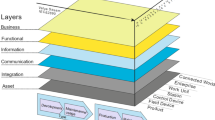
Overview
- A comprehensive approach to the design and analysis of networked engineered systems
- A robust framework for the digitalisation of networked manufacturing systems
- The concept of ‘smart platform’ that can be generalized and is applicable beyond the manufacturing domain for architecting networked engineered systems in other industries such as chemical processes and health care
Access this book
Tax calculation will be finalised at checkout
Other ways to access
About this book
In this monograph, the authors demonstrate how the integration of adaptability, operability, and re-configurability in the design of complex systems is indispensable for the further digitization of engineering systems in smart manufacturing.
Globalization of the customer base has resulted in distributed and networked manufacturing systems. However, current design methods are not suitable to address variations in product design, changes in production scale, or variations in product quality necessitated by dynamic changes in the market. Adaptability, operability, and re-configurability are key characteristics that are necessary to address the limitations of the current methods used to design networked manufacturing systems.
In recent years, the digital transformation driving Industry 4.0 has had an enormous impact on globally distributed manufacturing. Digitalisation, the integration of digital technology into networked engineered systems, is increasingly being adopted to respond to changes in the market. This is achieved by means of (a) the concurrent design of adaptable systems, (b) addressing flexibility in design parameters, (c) conducting an operability analysis, and (d) employing a reconfiguration strategy to address faults and variances in product quality and re-establish connectivity among the elements in the system. The design of manufacturing systems in the age of Industry 4.0 is addressed in this monograph. The authors introduce the concept of a ‘smart platform’ and a computational framework for the digitalization of networked manufacturing systems. They also suggest how the framework and techniques in this monograph are applicable beyond the manufacturing domain for architecting networked engineered systems in other industries such as chemical processes and health care, that are being transformed through the adoption of the Industry 4.0 construct.Similar content being viewed by others
Keywords
- Dynamic Management of Networked Engineered Systems
- Networked Manufacturing Systems
- Networked Engineered Systems
- Design of Networked Engineered Systems
- Mathematical Modeling of Multistage Manufacturing Processes
- Robust and Fault-Tolerant Operation of MMPs
- Robust and Fault-Tolerant Operation of MMPs
- Engineering Economics
Table of contents (7 chapters)
-
Front Matter
-
Back Matter
Authors and Affiliations
About the authors
Janet K. Allen holds the John and Mary Moore Chair and is a Professor in the School of Industrial and Systems Engineering, the University of Oklahoma, Norman, USA. She holds an S.B. from the Massachusetts Institute of Technology and a Ph.D. from the University of California, Berkeley. Janet has co-authored one textbook, three monographs and over 300 technical articles on the design of multiscale manufacturing processes, supply networks and, computer platforms to support human decision making in the design of mechanical and manufacturing systems. She is a Fellow of the American Society of Mechanical Engineers and a Senior Member of the American Institute of Aeronautics and Astronautics.
Sesh Commuri is a member of the faculty of the Department of Electrical and Biomedical Engineering at the University of Nevada, Reno. He holds a M.S. in Electrical Engineering from Indian Institute of Technology, Kanpur, and a Ph.D. in Electrical Engineering from the University of Texas, Arlington. He has served as the Editor-at-Large of the International Journal of Intelligent and Robotic Systems and on the Editorial Board of the International Journal of Distributed Sensor Networks. Sesh Commuri has over 30 years of experience in the areas of embedded controls, automotive control, and control of off-road equipment. Prior to joining the UNR, he held positions at the University of Oklahoma, Motorola, Vermeer and Xerox, and consulted for leading Fortune 500 companies. In 2015, he was honored by Engineering News-Record as one of the Top 25 Newsmakers of the Year.
Jelena Milisavljevic-Syed is an Assistant Professor of Industrial Design at the University of Liverpool, UK. Jelena holds a Ph.D. in Mechanical Engineering from the University of Oklahoma, Norman, USA, and an M.Sc. degree in Mechanical Engineering from the University of Nis, Serbia. Jelena has co-authored six journal publications and 20 technical publicationsdealing with dynamic management in the implementation of manufacturing systems, design and analysis of complex systems, product development, CVT in wind turbines, and FEM analysis. She is a member of the ASME, ASEE, GWI, MIET, Design Society, and LivWise.
Farrokh Mistree holds the L.A. Comp Chair and is a Professor at the School of Aerospace and Mechanical Engineering, the University of Oklahoma in Norman, USA. He has co-authored two books and three monographs, and over 400 papers dealing with the integrated realization of materials, products and associated manufacturing processes; the design of mechanical, thermal, and structural systems; ships and aircraft; and engineered networks. Farrokh is a Fellow of the ASME and an Associate Fellow of the AIAA. He is a Distinguished Alumnus of the Indian Institute of Technology, Kharagpur, India.
Bibliographic Information
Book Title: Architecting Networked Engineered Systems
Book Subtitle: Manufacturing Systems Design for Industry 4.0
Authors: Jelena Milisavljevic-Syed, Janet K. Allen, Sesh Commuri, Farrokh Mistree
DOI: https://doi.org/10.1007/978-3-030-38610-8
Publisher: Springer Cham
eBook Packages: Engineering, Engineering (R0)
Copyright Information: Springer Nature Switzerland AG 2020
Hardcover ISBN: 978-3-030-38609-2Published: 26 February 2020
eBook ISBN: 978-3-030-38610-8Published: 25 February 2020
Edition Number: 1
Number of Pages: XXV, 301
Number of Illustrations: 57 b/w illustrations, 82 illustrations in colour
Topics: Manufacturing, Machines, Tools, Processes, Production, Engineering Design, Automotive Engineering, Engineering Economics, Organization, Logistics, Marketing



